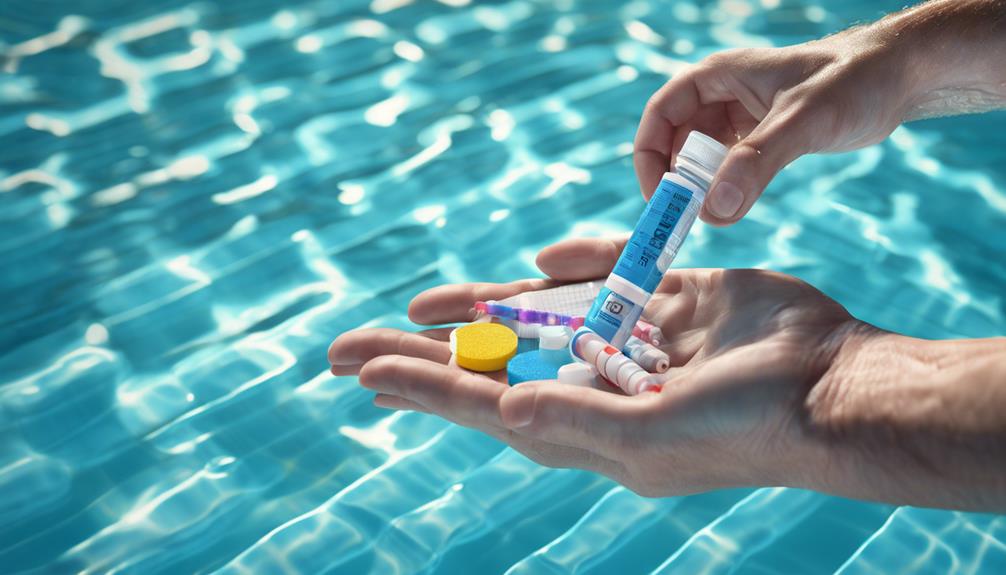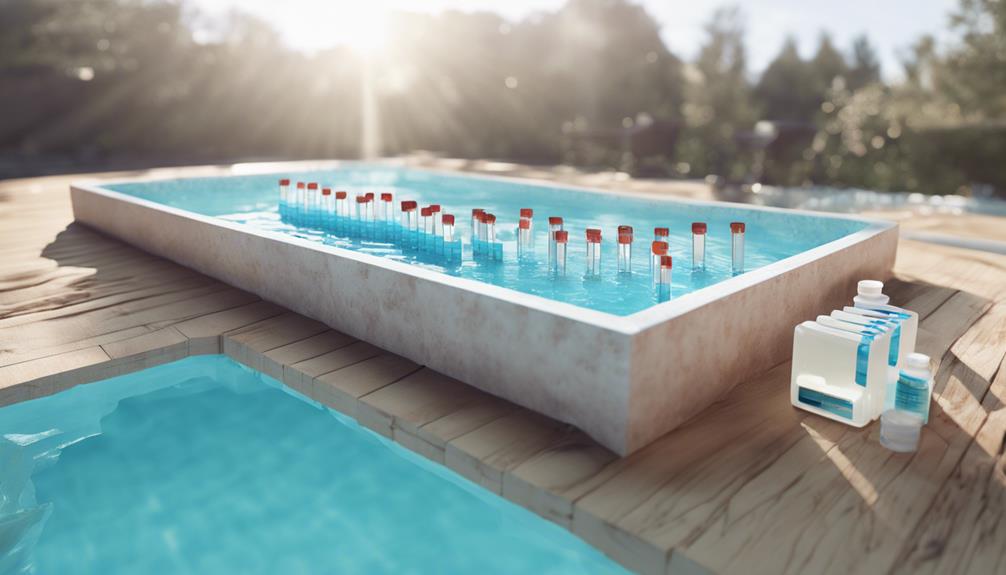When selecting a pool test kit as a beginner, you'll want to contemplate factors like type of chlorine test, included tests, ease of use, accuracy, and cost. You'll need a kit that provides reliable results for essential parameters like chlorine levels, pH, alkalinity, and calcium hardness. Choose between drop-based, FAS-DPD, digital, or liquid testing kits, each with its pros and cons. Evaluate your specific needs and budget, as high-quality kits may be worth the extra investment. To guarantee you're getting the most accurate results and value for your money, take a closer look at the features and capabilities of each kit, and explore what they can do for you.
Key Takeaways
- For beginners, consider a pool test kit that includes essential tests like chlorine, pH, alkalinity, and calcium hardness for comprehensive pool maintenance.
- Choose a test kit with a user-friendly design and clear instructions to ensure accurate results and easy use.
- Decide between test strip, liquid, or digital testing methods based on personal preference, budget, and desired level of accuracy.
- Consider the cost of the test kit, as well as the cost of replacement test strips or reagents, to ensure a budget-friendly option.
- Look for a reputable brand and high-quality test kit that provides accurate results and lasts longer to avoid frequent replacements.
Best Pool Test Kits for Beginners
When selecting a pool test kit, beginners should prioritize accuracy and ease of use, and weigh the following top-rated options that cater to different needs and budgets.
If you're looking for the most accurate results, the Taylor K-2006 is the gold standard, featuring FAS-DPD chlorine testing and including both chlorine and bromine tests. However, it comes with a higher price tag.
For a more modern approach, the LaMotte ColorQ 2X Pro 7 is a digital test kit that eliminates color matching, making it easy to operate, and can store test results in an app.
If you're on a budget, the Poolmaster 5-Way DPD Test Kit is an affordable option for chlorine and bromine users, including tests for chlorine, bromine, pH, and total alkalinity.
Alternatively, test strips like the AquaChek Select 7-in-1 Strips are easy to use and operate, but may not be as accurate as drop-based tests.
When choosing a kit, remember to ponder the type of chlorine test, included tests, ease of use, accuracy, and cost, as well as the importance of testing for calcium hardness, cyanuric acid, and other essential pool chemical indicators for effective pool maintenance.
Key Features to Consider
As you evaluate pool test kits, five key features stand out as essential to contemplate: the type of chlorine test, included tests, ease of use, accuracy, and cost.
When it comes to chlorine testing, you'll want to decide between test strips and liquid tests. Test strips offer quick, convenient results, while liquid tests provide more precise readings.
Consider what other tests are included in the kit, such as pH, alkalinity, and calcium hardness.
Ease of use is pivotal, especially for beginners. Look for a kit with clear instructions and a user-friendly design.
Accuracy is paramount, so opt for a digital kit that provides precise results.
Finally, consider the cost of the kit and the cost of replacement test strips or reagents. A more expensive kit may be worth the investment if it provides accurate results and is easy to use.
Accurate Testing Methods

You can rely on three accurate pool testing methods – drop-based testing, FAS-DPD testing, and digital testing – to guarantee precise readings and maintain a safe and healthy pool.
These methods provide accurate results, which are essential for ensuring proper pool chemistry, preventing damage to pool equipment and surfaces, and maintaining a safe and healthy swimming environment.
FAS-DPD testing, in particular, is considered the most accurate method, with test kits like the Taylor K-2006 providing reliable readings for both chlorine and bromine levels.
Digital test kits, such as the LaMotte ColorQ 2X Pro 7, eliminate the need for color matching and provide precise readings, making them a convenient and accurate option.
Liquid test kits, like the Taylor Complete Pool and Spa Test Kit, offer a broader range of testing options and are more accurate than test strips, but require precision when adding liquid reagents to avoid inaccurate results.
Types of Pool Test Kits
Pool owners can choose from a variety of test kit types, including drop-based, FAS-DPD, digital, and liquid test kits, each offering unique benefits and features to suit their specific testing needs.
When you're testing your pool water, selecting the right kit is vital to accurately measure water chemistry levels.
Drop-based kits, which use test strips, are a popular choice for beginners due to their ease of use and affordability.
FAS-DPD kits, on the other hand, provide more accurate readings and are ideal for pool owners who want precise results.
Digital testers offer quick and easy readings, while liquid testing kits provide a high level of accuracy and are often used by professionals.
As a pool owner, it's vital to understand the differences between these kits to guarantee you're getting the most accurate readings for your pool care.
Essential Testing Parameters

When you start testing your pool water, you'll need to focus on the essential parameters that affect the water's quality and safety.
You'll want to check pool chemical indicators, such as chlorine and pH levels, to certify they're within the recommended ranges.
Pool Chemical Indicators
Testing for essential parameters, including pH, alkalinity, calcium hardness, and chlorine levels, becomes a pivotal step in maintaining a safe and healthy swimming environment, as it helps detect chemical imbalances that can lead to eye irritation, respiratory issues, and equipment corrosion.
As you begin to explore the world of pool testing, it's paramount to understand the importance of monitoring these chemical indicators.
pH levels: Verify your pool's pH is between 7.2 and 7.8 to prevent acid and base imbalances that can harm swimmers and equipment.
Free Available Chlorine (FAC): Maintain FAC levels between 1 and 3 ppm to effectively sanitize your pool water and prevent bacterial growth.
Total Hardness (TH): Monitor TH levels to prevent scaling, corrosion, and cloudy water.
Total Dissolved Solids (TDS): Keep an eye on TDS levels to avoid cloudiness, scaling, and equipment damage.
Water Balance Testing
You'll need to measure five essential parameters to achieve ideal water balance: pH, total alkalinity, calcium hardness, stabilizer (CYA), and temperature. These parameters are critical to maintaining safe and healthy pool water.
A good pool test kit should be able to test for these parameters accurately and easily. Look for a kit that includes test strips or a digital reader that can provide quick and easy results.
When testing for pH, you'll want a kit that can test for both free chlorine and total chlorine levels. This will guarantee that your sanitizer levels are within the ideal range.
Total alkalinity and calcium hardness tests will help you maintain the correct levels to prevent scaling and corrosion. Stabilizer (CYA) testing will guarantee that your chlorine levels are protected from the sun's UV rays.
A color-coded system can make it easy to interpret the results, and a digital reader can provide accurate results with minimal effort.
When choosing a pool test kit, look for one that's easy to use and provides accurate results. With the right kit, you'll be able to achieve ideal water balance and enjoy a safe and healthy swimming experience.
Key Testing Parameters
The five essential testing parameters – free chlorine, total chlorine, pH, total alkalinity, and calcium hardness – form the foundation of proper pool chemistry and swimmer safety, and a good pool test kit should be able to accurately measure each of these vital components. A good pool test kit should provide reliable results for these key parameters.
Free chlorine: Test daily, aiming for 1-3 ppm to maintain sanitizing ability.
pH levels: Test regularly, targeting 7.2-7.8 for comfort and sanitizer efficacy.
Total alkalinity: Test regularly, aiming for 80-120 ppm to buffer pH changes.
Calcium hardness: Test regularly, targeting 200-400 ppm to prevent equipment corrosion and plaster damage.
When choosing a pool test kit, look for one that includes test strips or a liquid testing system that can accurately measure these parameters. Accurate results are vital for maintaining proper pool chemistry and guaranteeing a safe, enjoyable swimming experience.
Pool Test Kit Cost Factors
When shopping for a pool test kit, your budget will likely be influenced by several key cost factors, including the brand, quality, and features of the kit.
The cost of a pool test kit can vary greatly, ranging from $30 to thousands of dollars. High-end digital test kits are typically the most expensive, while basic test strips are often the most affordable option.
The type of pool test kit, such as a liquid test kit or digital reader, can also impact the overall cost, with digital readers often being more expensive than liquid test kits.
You should also consider the number of tests included in the kit, as kits that test for more parameters typically cost more than those that test for fewer parameters.
Additionally, the brand reputation and quality of the test kit can also influence the cost, with well-known brands often charging more for their products.
As you weigh your options, remember that investing in a high-quality test kit may be worth the extra cost in the long run, as it can provide more accurate results and last longer.
Frequently Asked Questions
What Pool Test Kit Is the Most Accurate?
You demand the most accurate pool test kit for precise pool water management, ensuring reliable test reliability and kit precision. The Taylor K-2006 stands out, offering accurate readings via FAS-DPD chlorine testing, guaranteeing ideal pH levels, chemical balance, and water clarity.
What Do Pool Professionals Use to Test Water?
You'll find that pool professionals rely on high-end, professional-grade tools, like the LaMotte ColorQ 2X Pro 7 or Taylor K-2006, to guarantee accurate water analysis, meeting industry standards for lab-quality results in commercial use, leveraging advanced techniques and expert opinions.
Are Pool Test Kits Better Than Strips?
You'll find that pool test kits outperform strips in water quality matters, providing accurate readings due to chemical reactions, whereas strips rely on subjective color matching, highlighting kit advantages and strip limitations, dispelling common misconceptions.
What Is the Difference Between the Taylor Pool Test Kits?
You're deciding between Taylor options, and understanding kit variations is key. The Taylor K-2006 and K-2005 differ in test ranges, precision levels, and warranty lengths, with the K-2006 offering a deluxe version with FAS-DPD chlorine testing for ultimate accuracy.
Conclusion
As you plunge into the world of pool maintenance, remember that a reliable test kit is your lifeline.
Don't let murky waters cloud your judgment – choose a kit that's accurate, easy to use, and exhaustive.
With the right tools, you'll be the master of your pool's chemistry, ensuring a safe and enjoyable experience for all.
The fate of your pool's clarity hangs in the balance – don't let it slip beneath the surface.

I’m Max, the founder and chief pool enthusiast behind Pool Pro Tips. As a passionate pool owner and cleaning expert, I created this website to share my knowledge and experience with you, helping you to keep your pool sparkling clean and safe for years to come.

